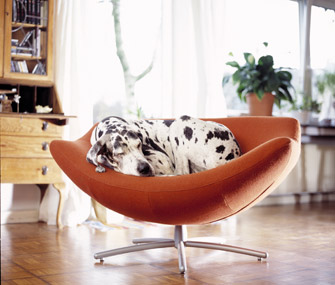Is It Cruel to Keep a Big Dog in a Small City Apartment?
Published on December 10, 2014
Skip To

When we see a big dog, it’s second nature to assume that he’s better suited to life in the country than in a pied-à-terre. But many canine Goliaths tend to be quiet and inactive in adulthood. They are just as happy to be your companion on a walk to the bodega or through the park as they are to hang out in your apartment while you are at work. Many city dwellers appreciate big dogs for just these qualities, as well as the aura of protection the dog provides — even if, in reality, he would never hurt a flea.
Big City Dogs
The breeds I mentioned above are usually good candidates for city life. They are active as puppies, no doubt, but they tend to mature into couch potatoes by the time they are a couple of years old. That doesn’t mean they don’t need exercise — all dogs do — but they don’t need long runs or hours of activity the way a Retriever or Border Collie does. Meeting the energy needs of those dogs is a full-time job, and life in a small city apartment may not be the best choice for them.Not every large or giant breed is suited to life in the big city, though. Some breeds, such as Giant Schnauzers, may need more activity than a busy owner can provide. Guardian breeds such as Anatolian Shepherds, Maremmas and Tibetan Mastiffs may dislike crowded city conditions. And though big dogs can make themselves at home in whatever square footage you provide them, you may find yourself tripping over them in a cramped apartment or sweeping up the pieces of a favorite item after your dog’s tail knocks it off the coffee table.
Conversely, some dogs who seem perfectly suited to city life because of their size might not be. Think Shetland Sheepdogs (barkers), Finnish Spitz (nicknamed King of the Barkers), Italian Greyhound and Bichon Frise (may be difficult to housetrain), Beagle (can be a howler) and Basenji (screamer with a high activity level).
Plan Ahead
Some questions to ask yourself before you commit to a big dog in the big city:- How will your dog get to and from your apartment? Do you have an elevator or will he have to walk up and down five flights of stairs? That can be tough on the joints of a large or giant breed.
- What will you do if your dog is incapacitated? How will you get him out of your apartment and transport him to the veterinarian?
- What’s your work schedule like? Your dog will need at least a couple of walks a day, even if they are short ones. Can you hire a dog walker to help out if you’re working late?
- What is this breed’s noise level?
- How active is this breed and how strong is its desire to work?
More on Vetstreet.com:

